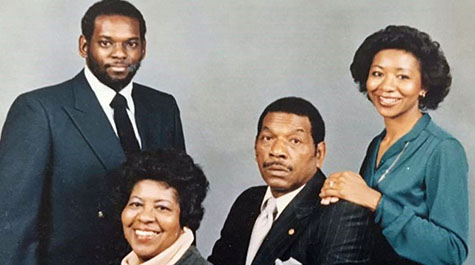A Pioneer and a Legacy that Keeps on Giving
In the 2017-2018 school year, William & Mary is commemorating the fiftieth anniversary of the first African American students in residence with a yearlong series of special events, guest speakers and performances. In conjunction with the commemoration, the Higher Education Program in the School of Education on March 15, 2018, will host alumni and emeritus faculty who were among the first African Americans to join William & Mary as students and faculty in the Learning from the Past to Shape the Future panel discussion event.
Almost two decades before these first African American students and faculty lived and worked on campus, Hulon LaVaughan Willis, Sr. became the first African American to enroll at William & Mary, earning his master’s of education in 1956. To reduce him simply to a degree earned, though, is to overlook the interesting and valuable life of a man who devoted his life to educating and serving others.
Born in Pittsburgh in 1922, he was the captain of his high school football team — a team with only two black players in a school with just three black students out of a graduating class of 200. Willis started at Virginia State University in 1941 on a football scholarship, but delayed his education to serve in the U.S. Army during World War II, returning to earn his undergraduate degree in physical education in 1949.
Virginia State didn’t offer the master’s degree in physical education he desired, and two Supreme Court cases decided in 1951 outlawed public schools from denying admission into graduate studies on the basis of race. He was admitted to William & Mary that same year and earned his master’s degree in 1956 after taking classes over four summers.

Willis was a trailblazer in every organization he got involved in. His wife Alyce said, “When he was invited to become a member of Kappa Delta Pi, one of the members told the director that he refused to be a member of an organization with a Negro…he was told that they regretted to lose him and Hulon was initiated in 1956.” During football games, she added, she and Hulon sat in the student section rather than in the end zone where other black spectators were segregated. He returned to Virginia State after graduation and served as a professor of health and physical education as well as director of campus police.
In addition to coaching football and wrestling, he pioneered the practice of martial arts in the Hampton Roads and Petersburg areas, becoming a well-known sensei. He served as the first — and at the time, the only — black man on the board of directors for the United States Karate Association. He taught karate to law enforcement, which caused some friction in the black community. “They thought I was giving the police a weapon to use against us,” recalled Willis in a contemporary article in Ebony magazine, and he was branded a traitor by local civil rights workers. But Willis argued that his work proved a benefit to both races. “By learning how to tap sensitive nerves and to perform other harmless, but effective, moves, the officers discovered they didn’t need billies, guns or chemical sprays to enforce the law in many situations,” he explained. “Instead of the massacres people expected, brutality complaints dropped sharply, and police-community relations rose accordingly.”
Willis stayed actively involved in the William & Mary community after graduation, becoming a member of the local Alumni Association chapter, the Parents’ Association Steering Committee, and the university’s STEP program, a precursor to current minority student recruitment initiatives. Despite passing away in 1989, Willis’ legacy lives on in the Hulon Willis Association, the university’s black and African-American affinity group which celebrated its 25th anniversary this year.
His W&M legacy also persists through his family: he, his son Hulon L. Willis Jr. ’77 and granddaughter Mica Willis ’13 comprise the first three-generation family of black alumni. A collection of books and electronic resources on multiculturalism and diversity was named for him in the School of Education library in 2010, an honor his wife, children, and grandchildren were able to accept on his behalf. Hulon Willis’ legacy lives on in the many ways he impacted the lives of others, whether it was as a soldier, teacher, coach, sensei, or husband and father.
